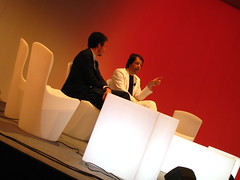New interactions in the hybrid space of the near future by Nicolas Nova
[lang_en]
The inclusion of ubiquitous technologies in our spatial environment is creating a new informational membrane around people, places and objects. Wireless infrastructures, mobile devices, access to social software and upcoming sensor networks enable novel practices that may reshape our relationship to the physical environment. When means of transportations start twittering, when people can digitally annotate the places they like and when mobile devices give access to the real-time pulse of the city, it’s likely that our behavior is beginning to be influenced by this new layer of information.
As a consequence, we foresee the advent of a new spatial milieu where our environment is becoming more adaptive and instantaneous, potentially offering sustainable, open and attractive futures. However, these changes raise an important set of concerns regarding the challenges and possible threats that may emerge. Who will design this hybridized space? How will this information layer be integrated in the existing urban fabric? How do citizens can be taken into account?
Given this broad range of questions, this workshop will focus on how this information layer can recombine the way we move ourselves in physical space. How can it impact transportation systems? May it allow new forms of interactions? Can it enable more sustainable transport practices?
The workshop will address these issues by looking at three angles:
- A thorough exploration of people’s NEEDS with regards to physical space. We will try to cover a broad range of environment (not only cities but also suburbs and countryside).
- An analysis of the possible SOLUTIONS to meet these needs in a DISRUPTIVE way.
- A discussion of the existing ANSWERS.
[/lang_en]
[lang_it]
The inclusion of ubiquitous technologies in our spatial environment is creating a new informational membrane around people, places and objects. Wireless infrastructures, mobile devices, access to social software and upcoming sensor networks enable novel practices that may reshape our relationship to the physical environment. When means of transportations start twittering, when people can digitally annotate the places they like and when mobile devices give access to the real-time pulse of the city, it’s likely that our behavior is beginning to be influenced by this new layer of information.
As a consequence, we foresee the advent of a new spatial milieu where our environment is becoming more adaptive and instantaneous, potentially offering sustainable, open and attractive futures. However, these changes raise an important set of concerns regarding the challenges and possible threats that may emerge. Who will design this hybridized space? How will this information layer be integrated in the existing urban fabric? How do citizens can be taken into account?
Given this broad range of questions, this workshop will focus on how this information layer can recombine the way we move ourselves in physical space. How can it impact transportation systems? May it allow new forms of interactions? Can it enable more sustainable transport practices?
The workshop will address these issues by looking at three angles:
- A thorough exploration of people’s NEEDS with regards to physical space. We will try to cover a broad range of environment (not only cities but also suburbs and countryside).
- An analysis of the possible SOLUTIONS to meet these needs in a DISRUPTIVE way.
- A discussion of the existing ANSWERS.
[/lang_it]























